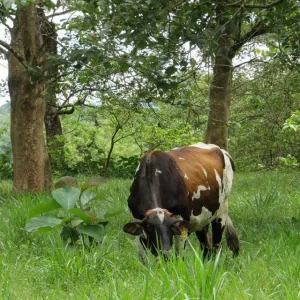Women Lead Sustainable Livestock Farming near the Colombian Amazon Rainforest
When trees and livestock compete for land, the trees usually lose, but it doesn’t have to be this way. However, centrally designed plans to implement tree-livestock coexistence in deforested areas don’t always work on faraway farmland. The ineffectiveness can be due to trying to accomplish too much too quickly. Transforming hundreds of thousands of hectares of treeless or degraded pastures

Women Lead Sustainable Livestock Farming near the Colombian Amazon Rainforest
When trees and livestock compete for land, the trees usually lose, but it doesn’t have to be this way. However, centrally designed plans to implement tree-livestock coexistence in deforested areas don’t always work on faraway farmland.
The ineffectiveness can be due to trying to accomplish too much too quickly. Transforming hundreds of thousands of hectares of treeless or degraded pastures into sustainable landscapes for livestock, nature and people should be a gradual, low-disruption process, and it should start with the people already quietly transforming small pieces of land – and those who want to.
In the southern Colombian department of Caquetá, which is recovering from decades of armed conflict and is now facing reckless deforestation and damaging impact of climate change, the people leading the change tend to be women, as shown in new research.
When women are in charge of the land (and only 15% of them were in the study), they are more likely than men to have silvopastoral livestock systems, where cattle graze amongst the trees and eat plants already growing on the land. Whether they manage the land or not, women are more willing to integrate nature into livestock farming.
“We found that women are more motivated to conserve the environment,” said Augusto Castro – Researcher at the Alliance of Bioversity International and CIAT and the lead author of the study published in ‘Scientific Reports‘. “Additionally, they have a higher propensity to adopt silvopastoral systems.”
Researchers collected data on more than 2,800 paddocks: small parcels of farmland for raising livestock. Along with gender-differentiated data, they gathered socioeconomic information from farmers that point to several paradigm-challenging ways to incentivize the adoption of silvopastoral systems in conflict-affected settings in Colombia.
“We’re still developing strategies to promote sustainable silvopastoral systems based on beliefs and not on facts,” Castro said. “We need to use data from systematic studies to scale up silvopastoral systems successfully.”

